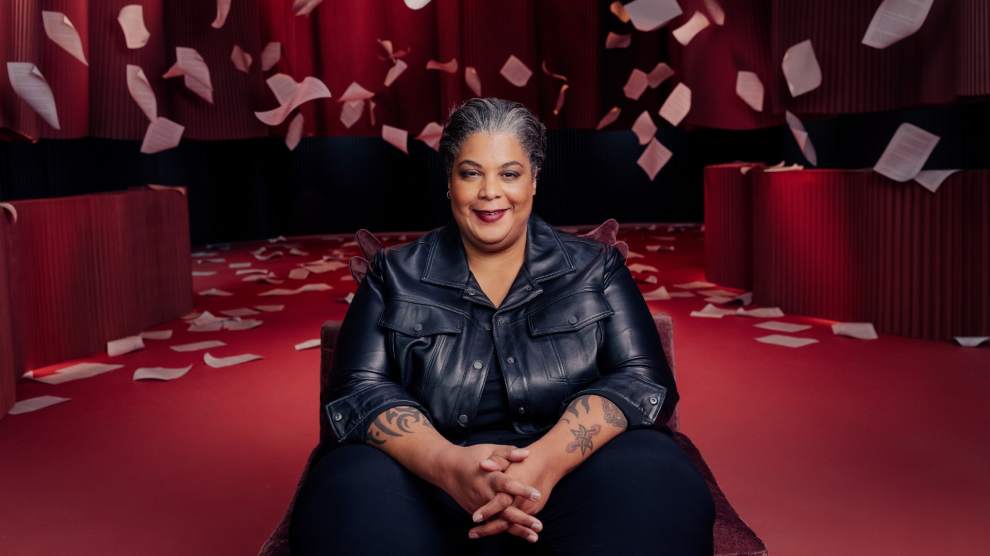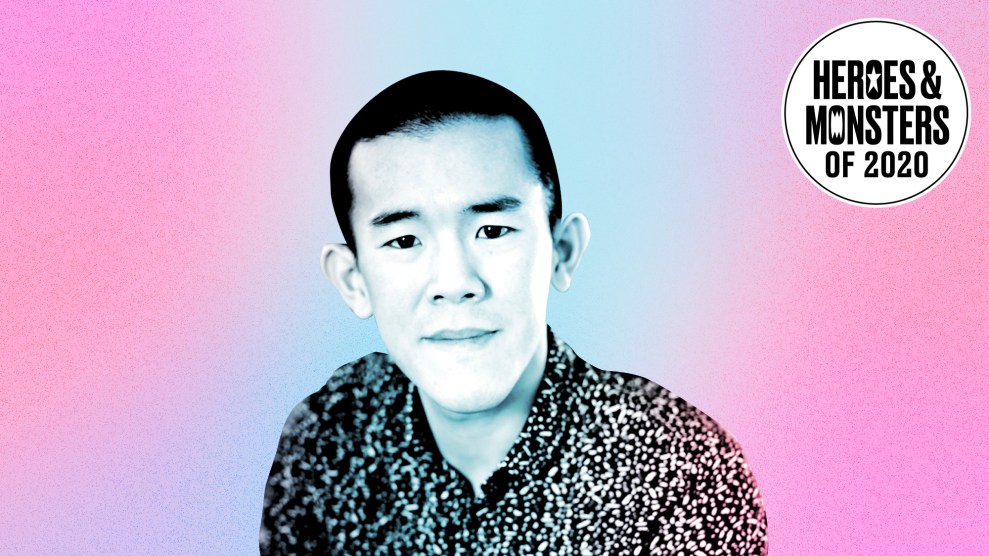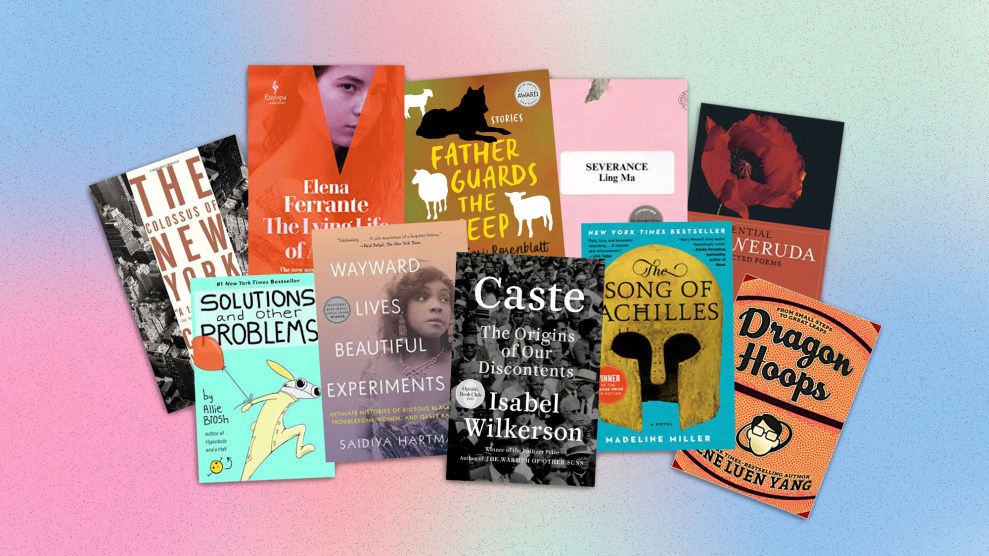
MasterClass
Roxane Gay is one of the most prolific and versatile writers of our generation. Her works include a best-selling collections of essays (Bad Feminist), a blockbuster memoir (Hunger), the Black Panther comics, and countless essays of cultural criticism. She has a New York Times advice column on work, money, and careers. Add to all this, a book of writing advice coming out in November called How to Be Heard, and a screenplay for Hunger and a YA novel that are works in progress. And, oh yes, she also has a podcast and is running a monthly online book club.
How does she do it? How has she cultivated her voice over the years? How does she write things that make a difference?
Gay answers these questions and more in her sharp and accessible series on MasterClass called Writing for Social Change. She joined Jamilah King for a conversation in late February. For the full experience, listen to their interview on the Mother Jones Podcast or read the transcript below, which has been lightly edited and condensed.
Jamilah King: I wanted to start by asking you about something that you said in the course: that cultural criticism brought about the revolution we’re experiencing in entertainment right now. I speak as a big TV buff, and there’s been no better time to watch TV. How would you describe that revolution and the role of cultural criticism in making it happen?
Roxane Gay: I don’t know that cultural criticism made it happen. I think that our television tastes have evolved and matured, and writers have been given more leeway. I think it was really paid cable premium cable that made it possible, and it is cultural criticism that sustained it and gave it the gravitas that it now has.
What is cultural criticism to you?
Cultural criticism is the way we contextualize the media that we consume. We tend to do it based on who we are, and what we prefer and our identity. Cultural criticism that I might write is going to be vastly different from the cultural criticism that a white guy is going to write, or that an Asian woman is going to write. I think that’s what makes it such a rich field. When it’s done well and you have a diversity of perspectives—not just in terms of demography, but in terms of intellectual thinking and ideas and aesthetic—it makes for a really rich conversation. We’ve seen some really great conversations about film and television and literature in recent years.
How do you approach blending cultural criticism and politics? Do they automatically go together, or are they different?
I feel they go together. I think culture exists on a spectrum. A lot of what we see on our televisions and in movie theaters has been shaped by the political climate.
So there’s this term that I honestly hate: “culture wars.” It’s a term that’s been bandied about for decades. Does it mean anything to you? And if it does, how do you think it’s changed over the years?
It doesn’t mean a whole lot to me. I think it’s the kind of thing that people say when they’re too lazy to engage with the world as it is, and they want to dismiss the very material realities of most people’s lives. I get really frustrated when people are like, “Oh, it’s the culture wars.” What precisely does that mean?
Right. Nowadays there’s something called canceled culture. Does that actually exist?
No, it does not. Cancel culture is this boogeyman that people have come up with to explain away bad behavior and when their faves experience consequences. I like to think of it as consequence culture, where when you make a mistake—and we all do, by the way—there should be consequences. The problem is that we haven’t figured out what consequences should be. So it’s all or nothing. Either there are no consequences, or people lose their jobs, or other sort of sweeping grand gestures that don’t actually solve the problem at hand.
Speaking of cancel culture, there’s been a major story happening in the small but mighty world of podcasts. I’m sure you know the Reply All/Bon Appétit controversy. Reply All has announced that they’re canceling the series partway through due to some really disturbing revelations that came to light about the host. What are your thoughts on this?
I think it’s a mistake. I understand that the reporting is not finished on the final two episodes. But this is not the Mona Lisa. Somebody can finish these stories. I think the Bon Appétit story is interesting. And it’s typical. And it deserves to be told. I think it’s really reflective of how important the story is that two of the creators of the Reply All reportage were doing some of the same behaviors they were reporting on. It just speaks to how endemic this issue is. It would be a step in the right direction for Reply All to finish those two episodes and release them, and then do a third episode about what happened with Reply All.
You said that it’s typical. What do you mean by that?
A lot of media organizations have serious problems. The Gimlet situation is not special. It’s not unique. There are all kinds of faves who are really terrible and who are not really interested in progress, change, or making room at the table for others. That’s unfortunate because they’re working from a place of scarcity, and this idea that there can only be a chosen few. I get where that comes from. But I don’t think it’s a useful way of being a professional. Then some people are just mean and petty. I think people should be whoever they are, but when your meanness is racist and homophobic and transphobic and any other kind of bigotry, that’s where the problem lies, and it has to be addressed.
I saw that recently, you interviewed Sohla El-Waylly, the chef and Youtube star who very publicly left Bon Appétit, on your podcast, Hear to Slay. I know that fried chicken was a major topic of discussion. But did you learn anything from her that changed your insights into what happened at Bon Appétit?
What I learned is about the human cost of being at the center of one of these stories. It’s not fun for the person. Sohla was a delight. The renewed interest in her was a long time coming and deserved. I got the impression, though, that she just wondered, are you going to be here next month? Next year? Are you going to care then? In a few weeks people are going to forget all about what happened at Bon Appétit. It won’t come up again until another media property is exposed for being a mess. There’s so much about consequence culture that we really need to think through and talk about to figure out: What does happen next? How do we sustain this level of energy? Especially given the political climate of the past four years, I understand why we have very limited attention spans. But the underlying issue is is racism and misogyny and so many other forms of bigotry. So how do we root that out? How do we create equitable workplaces where people can thrive?
It seems like you get inspiration from everywhere. You were recently interviewed by AV club about your love-hate relationship with HGTV. How do you approach the things you watch, read and listen to as fodder for your own cultural criticism?
I actually don’t go into watching pretty much anything with a mind to use it as fodder for cultural criticism. I’m generally watching something for pleasure, and I see something that makes me think. Then I start to follow that thread. The only time I watch something going in knowing I’m going to do cultural criticism about it is when I get an assignment.
You talked in your MasterClass about how expertise comes in a lot of different packages. What are some of the barriers to entry that still exist in media?
The biggest barrier is either you have generational wealth, or you don’t. And if you don’t, it’s a lot harder to take these ridiculous $35,000 a year jobs. The jobs are not ridiculous, but the pay is. Living in New York on $35,000 a year is a real challenge. Frankly, living on in New York for under $100,000 a year is a challenge. It is done all the time. I’ve done it. You know, I’ve been that $35,000 a year person. And less. Fortunately, I was able to do it elsewhere. When you’re living in Charleston, Illinois, or Houghton, Michigan, it’s like, yeah, I can make this work. But would I have been able to make it work in the city? No. I think it’s really that about removing some of the economic barriers so that a more diverse range of people are able to take these jobs. It’s not a pipeline issue. And I wish people would stop dismissing it as one.
Do you think the pandemic and COVID and people working remotely so often is gonna maybe change a little bit of that?
I do. I have a project coming up that’s going to be announced, and I’m going to be hiring an editorial assistant. Normally they would have to be in New York, but now they can be anywhere. I’m really excited about that. I think more publishers and people in media are going to be willing to consider remote candidates.
So back to MasterClass, the self-help space is overwhelmingly white. Books, shows, all of it. That can be really tough if you’re Black and queer. What does it mean for you as a Black feminist to be on a platform like MasterClass?
It’s great to have many, many, years of writing—well before anyone even knew who I was—recognized. Maybe I do know something. Maybe I am something of an expert on writing. It’s great to be recognized. The most important thing to me is that I’m not the only one. Who’s next? I don’t know who that next person is going to be, but I could give you 10 names. I am excited, but I hope that this is just the beginning and that MasterClass continues to recognize that there is a lot of talent out there. A lot of Black women, queer women, women across the racial spectrum are ready and willing and able to step up to the plate and demonstrate their excellence.
I want to talk about a particular video in the MasterClass series about how you write about trauma. You also published a Scribd essay recently, Writing into the Wound, and a really interesting conversation with Monica Lewinsky about trauma that was published in Vanity Fair. How do you approach writing about trauma in a way that is generative and useful and not exploitative?
There are a lot of different ways. A lot of times I choose to write directly into it because nothing is worse than the trauma itself. For people to understand the effects of trauma, they need to understand just how profoundly people have suffered. I think that there’s a way to do it without being exploitative. That’s not the only way to do it. But I find that that can be a really useful way: to not flinch.
So your MasterClass is called “Writing for Social Change.” What does social change mean to you?
To me, it means finding ways to get people to consider other points of view, because that’s the logjam in a lot of our political discourse. We are, and I include myself in this, very deeply entrenched in what we believe. There’s very little that’s going to move us. Take, for example, reproductive freedom. There’s literally nothing you’re going to say that’s going to make me change my mind about a woman’s right to bodily autonomy. So how do you have productive conversations about that with people who believe in the sanctity of life but don’t think that it extends to women? It’s challenging. And so you have to find ways to write beyond that impasse and try to reach people so that they will be open to changing their minds. Once they’re open, okay, now what more do I need to do to get you to actually change your mind? So that we can see some movement from the really stark divides that we’re currently dealing with, not only in this country, but in many countries around the world.













